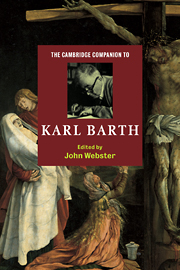Book contents
- Frontmatter
- 1 Introducing Barth
- 2 Theology
- 3 Revelation
- 4 The Bible
- 5 The Trinity
- 6 Grace and being
- 7 Creation and providence
- 8 Karl Barth’s Christology
- 9 Salvation
- 10 The humanity of the human person in Karl Barth’s anthropology
- 11 The mediator of communion
- 12 Christian community, baptism, and Lord’s Supper
- 13 Barth’s trinitarian ethic
- 14 Karl Barth and politics
- 15 Religion and the religions
- 16 Barth and feminism
- 17 Barth, modernity, and postmodernity
- 18 Karl Barth
- Index
9 - Salvation
INTRODUCTION
Published online by Cambridge University Press: 28 May 2006
- Frontmatter
- 1 Introducing Barth
- 2 Theology
- 3 Revelation
- 4 The Bible
- 5 The Trinity
- 6 Grace and being
- 7 Creation and providence
- 8 Karl Barth’s Christology
- 9 Salvation
- 10 The humanity of the human person in Karl Barth’s anthropology
- 11 The mediator of communion
- 12 Christian community, baptism, and Lord’s Supper
- 13 Barth’s trinitarian ethic
- 14 Karl Barth and politics
- 15 Religion and the religions
- 16 Barth and feminism
- 17 Barth, modernity, and postmodernity
- 18 Karl Barth
- Index
Summary
INTRODUCTION
Karl Barth is a systematic theologian in the respect that nothing written in one place is said without implicit or explicit reference to other theological themes. We shall therefore not understand him when he speaks of salvation if we fail to bear in mind something of what he has said about revelation and the Trinity, and above all the doctrine of election. While there may not be a single dogmatic 'centre', in the sense of a single organizing idea, to Barth's theology, there is an overall unity to his conception of God's action. It is that focus on action which supplies both the possibilities for, and the impassable limits of, any systematic theological construction. The realities of and limits to our knowledge of God's action provide the parameters for all human theological speech.
It is further the case that Barth fought a lifelong battle against what he called abstraction: the treatment of any topic out of relation to the fact that the divine action which provides the basis and possibility of theology is action in relation to the world. In Christ, God moves into free and loving relation with the world, particularly the human world, so that any theology that does not bear on ethics broadly conceived – that is to say, any theology without bearing on a life lived before God – is not Christian theology. This second feature in particular has a broad bearing on our topic. First, because Barth is an evangelical theologian – a theologian rooted in the gospel of Jesus Christ – everything that he wrote, certainly in the Church Dogmatics, is concerned with salvation: with the end to which human life is directed.
- Type
- Chapter
- Information
- The Cambridge Companion to Karl Barth , pp. 143 - 158Publisher: Cambridge University PressPrint publication year: 2000
- 3
- Cited by

